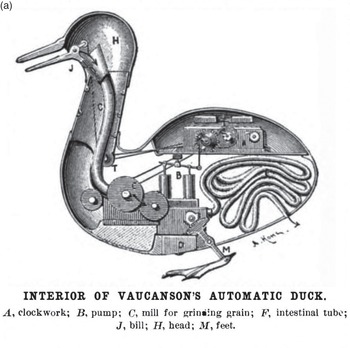-
 Beverley
137Vivisection was a very common form of experimentation and demonstration in medical colleges of the time - and in various forms, up to the present. Whether Descates himself conducted any such lectures using dogs has been the subject of debate, but he was a practicing physician, so he must have at least attended those lectures. He certainly didn't invent or initiate them, but he was famous, and his apologetics did help to legitimize vivisection as sound scientific practice.
Beverley
137Vivisection was a very common form of experimentation and demonstration in medical colleges of the time - and in various forms, up to the present. Whether Descates himself conducted any such lectures using dogs has been the subject of debate, but he was a practicing physician, so he must have at least attended those lectures. He certainly didn't invent or initiate them, but he was famous, and his apologetics did help to legitimize vivisection as sound scientific practice.
Descartes famously thought that animals were merely ‘mechanisms’ or ‘automata’ – basically, complex physical machines without experiences – and that as a result, they were the same type of thing as less complex machines like cuckoo clocks or watches. He believed this because he thought that thoughts and minds are properties of an immaterial soul; thus, humans have subjective experience only because they have immaterial souls inhering in their physical bodies. However animals, reasoned Descartes, show no signs of being inhabited by rational souls: they don’t speak or philosophise, and so (as far as we can tell) they lack souls, and minds.
He bent some little way to accord animals sensation and emotion, but still considered it legitimate for humans to use them like objects. — Vera Mont
I'm not sure what to believe regarding the accuracy of this. Of course, I know what I think about it if it is true, and for some reason, it would not surprise me if it was. However, I also believe that nothing in life is 100 percent certain, (ironically, something that Descartes refused to accept) and so, I will probably never know for sure. -
 Beverley
137I wonder if he was 100 percent certain that animals lack souls and minds and that it was not unethical to abuse them? This is, perhaps, one example of how being 100 percent certain might be dangerous.
Beverley
137I wonder if he was 100 percent certain that animals lack souls and minds and that it was not unethical to abuse them? This is, perhaps, one example of how being 100 percent certain might be dangerous. -
 Vera Mont
4.8k
Vera Mont
4.8k
I don't think he was nearly as certain of anything as he made out. Remember, there was a powerful Catholic church to watch out for; you had to be pretty careful what opinions you expressed, not to end up like Bruno. He spent a lot of time in the more liberal Protestant Netherlands, but returned to Paris and wanted to be safe there.
In 1641 Descartes published the Meditations on First Philosophy, in Which Is Proved the Existence of God and the Immortality of the Soul. Written in Latin and dedicated to the Jesuit professors at the Sorbonne in Paris, the work includes critical responses by several eminent thinkershttps://www.britannica.com/biography/Rene-Descartes/Meditations -
 Wayfarer
26.2kThere is, however, little doubt that Descartes did believe that animals were essentially no different to machines. He identified 'the soul' as the rational faculty of humans - a view which has considerable provenance - but he interpreted it in a rather absolutistic way. He believe the human body was essentially mechanistic, governed by the immaterial soul, which he said interacted with the body through the pineal gland, but that we humans experience emotions and feelings due to the presence of the soul. So he viewed non-human animals, lacking a rational soul, as machines, as depicted in Monsieur Vaucanson's well-known mechanical duck, which served to illustrate Descartes view (in De Homine, 1662) that all animals could be reductively explained as automata.
Wayfarer
26.2kThere is, however, little doubt that Descartes did believe that animals were essentially no different to machines. He identified 'the soul' as the rational faculty of humans - a view which has considerable provenance - but he interpreted it in a rather absolutistic way. He believe the human body was essentially mechanistic, governed by the immaterial soul, which he said interacted with the body through the pineal gland, but that we humans experience emotions and feelings due to the presence of the soul. So he viewed non-human animals, lacking a rational soul, as machines, as depicted in Monsieur Vaucanson's well-known mechanical duck, which served to illustrate Descartes view (in De Homine, 1662) that all animals could be reductively explained as automata.

Welcome to The Philosophy Forum!
Get involved in philosophical discussions about knowledge, truth, language, consciousness, science, politics, religion, logic and mathematics, art, history, and lots more. No ads, no clutter, and very little agreement — just fascinating conversations.
Categories
- Guest category
- Phil. Writing Challenge - June 2025
- The Lounge
- General Philosophy
- Metaphysics & Epistemology
- Philosophy of Mind
- Ethics
- Political Philosophy
- Philosophy of Art
- Logic & Philosophy of Mathematics
- Philosophy of Religion
- Philosophy of Science
- Philosophy of Language
- Interesting Stuff
- Politics and Current Affairs
- Humanities and Social Sciences
- Science and Technology
- Non-English Discussion
- German Discussion
- Spanish Discussion
- Learning Centre
- Resources
- Books and Papers
- Reading groups
- Questions
- Guest Speakers
- David Pearce
- Massimo Pigliucci
- Debates
- Debate Proposals
- Debate Discussion
- Feedback
- Article submissions
- About TPF
- Help
More Discussions
- Other sites we like
- Social media
- Terms of Service
- Sign In
- Created with PlushForums
- © 2026 The Philosophy Forum



